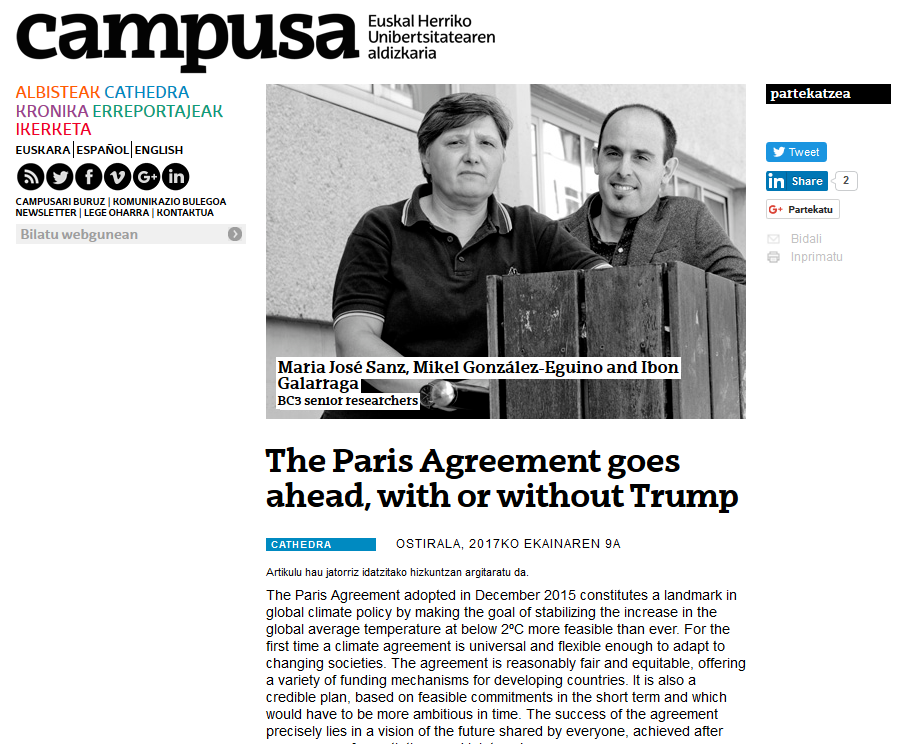“The Paris Agreement goes ahead, with or without Trump” open letter edited by BC3 Researchers Maria Jose Sanz, Mikel Gonzalez-Eguino and Ibon Galarragak published by “Campusa Euskal Herriko Unibertsitatearen aldizkaria”


Ikusi Berriaren iturria hemen
The Paris Agreement goes ahead, with or without Trump
CATHEDRA
Artikulu hau jatorriz idatzitako hizkuntzan argitaratu da.
The Paris Agreement adopted in December 2015 constitutes a landmark in global climate policy by making the goal of stabilizing the increase in the global average temperature at below 2ºC more feasible than ever. For the first time a climate agreement is universal and flexible enough to adapt to changing societies. The agreement is reasonably fair and equitable, offering a variety of funding mechanisms for developing countries. It is also a credible plan, based on feasible commitments in the short term and which would have to be more ambitious in time. The success of the agreement precisely lies in a vision of the future shared by everyone, achieved after many years of negotiations and joint work.
Donald Trump’s decision to withdraw the United States from the Paris Agreement is an historical mistake and could further complicate the progression of the rest of the nations. The decision may also have negative implications for American society itself if it finally turns its back on the new opportunities for investment and job creation on clean energy. And, undoubtedly, this decision will isolate the United States even more from the international sphere. The flexibility offered by the Paris Agreement and the repeated requests of many political, economic, social and even religious leaders all over the world makes this a decision very difficult to be explained from a rational perspective.
The United States is the second largest emitter and had pledged to cut its emissions to 26-28% below 2005 levels by 2025. It is estimated that abandoning its commitments could translate into a future rise in global temperature of up to 0.3ºC (that will be added to the current 1ºC increase) that would have to be compensated by all involved. One of the initial fears was that the withdrawal could have generated a “domino effect” leading to the subsequent withdrawal of other countries. However, this effect has not occurred and does not seem likely to occur in the future. Key players such as China, European Union and India have pointed towards their determination to continue with the Paris Agreement, with or without the United States.
Perhaps the most disturbing part of Trump’s decision is his stance in regard to climate science, neither of which were even mentioned in his speech. The recent extreme weather events in Asia, sea level rise or melting ice in the Artic, are unmistakeable signs of a climate change. Nevertheless, Trump chose not to mention the overwhelming evidence accumulated over decades by scientific bodies, such as the Intergovernmental Panel on Climate Change or IPCC (to meet this week in the Campus of Bizkaia) or the National Science Foundation. Nor did he mention the reports published by his National Security Agency which has been pointing towards climate change as a risk to the national security of the United States.
But while the withdrawal of the United States may undermine global efforts to deal with the challenges of climate change, paradoxically it may also boost our actions. Today the fight against climate change is seen by the vast majority not only as a need, but also as an opportunity, including a great number of North American companies. For example, the country’s 25 leading companies (among which are Morgan Stanley, Microsoft, Unilever and Google) signed a document confirming the economic benefits of the Paris Agreement. Furthermore, several companies in the petrol industry, like BP and ExxonMobil, have spoken out in favour of the Paris Agreement since logically the first thing they seek for their investments is certainty and stability.
The global financial industry too is rapidly starting to divest from fossil fuels, while shareholders are demanding that companies explain the risk incurred by their exposure to assets which may rapidly lose value. For example, Blackrock, the world’s biggest private investment fund (with a volume of assets equivalent to the joint GDP of Germany and France) has already removed all investments associated to the coal. On the other hand, renewable energies have experienced an extraordinary rise and are increasingly more competitive in many places. This was demonstrated, for example, by the two latest renewable energy auctions organised by the Spanish Government, which were awarded without any subsidy.
Fortunately, the United States is an enormously plural and the decision has been accompanied by disagreement which guarantees harsh internal opposition. For example, the governors of California, New York and Washington have formed a coalition to continue with their own plans to reduce emissions. These sentiments have also been expressed by myriad mayors of large cities.
While Trump is certainly making things more complicated, nothing is impossible and the opportunities arising from this challenge for our society and our planet may also be of unprecedented magnitude. We join with French President Emmanuel Macron´s response to Trump: “Let´s make our planet great again”.
Photos: Mikel Mtz. de Trespuentes. UPV/EHU.
